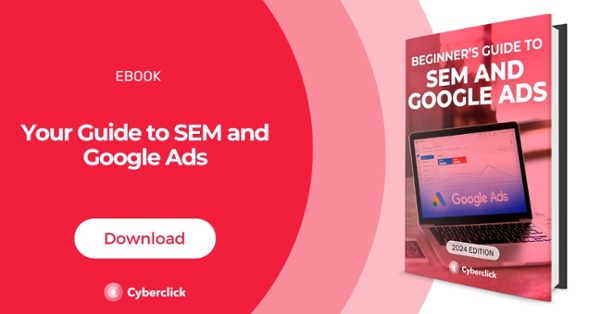- Home
- Cyberclick Academy
- SEM
- SEM and SEO
SEO and SEM: definition, differences, and combined use
SEM Content
- What Is SEM? Definition, Advantages, Disadvantages, and Key Concepts
- SEO and SEM: Definition, Differences, and Combined Use
- SEM Positioning: Definition, Characteristics, and Advantages
- What Is a SEM Campaign? Definition, Advantages, and Examples
- What Is Search Engine Marketing? Definition and Basic Concepts
- How to Create a SEM Marketing Strategy for Your Company Step by Step
- How to Set Up and Optimize SEM Campaigns on Google Ads and Their Benefits
Index
SEO and SEM are essential in online marketing, but they can also cause some confusion. Which is better for your brand and how can you use each of them in your marketing strategy? It's time to get to the bottom of this topic.
SEO Definition
SEO (search engine optimization) is defined as the actions taken to improve and refine web pages for them to rank higher in internet search results. It is very important to note that SEO refers to organic results. Organic results mean that no payment was made to the search engine company to position better.
What Is SEO in Marketing?
When a website or webpage is optimized, it ranks highly in search results and therefore receives increased traffic. This leads to increased brand awareness and sales. This is why SEO is such an important part of a digital marketing strategy.
SEO strategies often focus on Google since this search engine is used by the vast majority of people. However, as search engines have evolved over the years, SEO strategies have become increasingly sophisticated and complex. Despite this, two fundamental factors influence the position of a web page.
- Relevance. Google considers a website to be relevant when it corresponds accurately with a specific search and when it responds to the question or query that the user has asked. To improve the relevance of your website, use SEO techniques such as optimizing keywords and URLs, making sure your pages load quickly, improving user experience, etc.
- Authority. A website has authority when it is popular. This is measured by the number of links directing people to it. To improve the authority of your website, you can use SEO off-site techniques such as link building.
SEM Definition
SEM (search engine marketing) is defined as a digital marketing strategy aimed at increasing the visibility of a website or webpage in search engine results pages, also known as SERPs. This is accomplished through paid advertising and can sometimes be called paid search or PPC (pay-per-click).
What Is SEM in Marketing?
In SEM, the goal is to improve the position of your website through paid ads that appear in search engine results for certain keywords. Given the prominence of Google as a search engine, a common and very important part of SEM is Google Ads. SEM strategies include creating and optimizing digital ads as well as creating a budget to pay for the ads.
SEM is a key method of driving conversions for digital marketing campaigns. This is because paid ads are frequently linked to landing pages, product pages, etc. that help move web traffic along the sales funnel.
The Main Differences Between SEO and SEM
Both SEO and SEM seek to improve the positioning of a website in search engines (such as Google) but there are several differences between them.
- The most obvious difference is the type of investment they require. There is the idea that SEO is free, but this is not exactly true. Creating a web page capable of occupying the top positions in search results requires time, effort, and a budget. It is an initial investment that yields results down the line. On the other hand, if you use SEM, you will have to continue paying for each click that your ads get.
- The position that your website will occupy in the search engine results pages is also different. Ads from Google Ads occupy a band at the top, while organic search results fill the central space.
- The type of content is different for each strategy. SEO is based on creating quality content, usually in longer formats. Meanwhile, SEM has ads with a very small number of characters and landing pages designed to achieve the maximum impact.
- Finally, the time investment is different. While SEM can get results in the short to medium term, SEO is a medium to long-term bet.
How to Combine SEO and SEM in Your Marketing Strategy
The next question is what is better, SEO or SEM? The answer is both. It’s best to combine them and take advantage of the potential that each has to achieve better overall results.
At Cyberclick, our philosophy is to combine SEM and SEO in the following way: SEM first, SEO later.
- First, you will need to conduct a preliminary study of the most searched and clicked keywords by sector, product, or service. To do this, you can use tools such as Ubersuggest, Google Keyword Planner, or Semrush which are specially designed for SEM. The idea is to find keywords that have a high search volume (many users are looking for them) but with low competition (not many web pages feature them).
- Using these insights, you can start your SEM campaigns to attract visitors. This way, you can achieve tangible results from the start without the long wait that organic positioning strategies require to really take off.
Fortunately, all this work you've done can also be used for SEO. Once you know which keywords are most relevant, the next step is to use this information to plan your content strategy, and to build your website, blog, and social networks around these keywords.
It's not about including them in the texts without rhyme or reason. It's about trying to understand what users are looking for and how you can respond to their needs with quality content, all while reinforcing your link-building strategy. This way, in the medium to long term, you will see the fruits of your labor in the organic positioning on Google.
SEO to OSO: Dominating the New Search Ecosystem
As digital marketing continues to evolve, traditional SEO is shifting more and more towards omnisearch optimization (OSO). This strategy focuses on optimizing content across all digital platforms where users conduct searches—not just Google, but also social media, video platforms like YouTube, and AI tools like ChatGPT.
In today’s search ecosystem, being visible on all relevant search touchpoints is essential. OSO allows brands to adapt to the ever-changing user behaviors and digital tools, guaranteeing increased visibility and engagement across a broader range of search channels.
Recursos para seguir aprendiendo: ebooks, vídeos y cursos

Cyberclick

Cyberclick

Cyberclick

Cyberclick

Cyberclick



